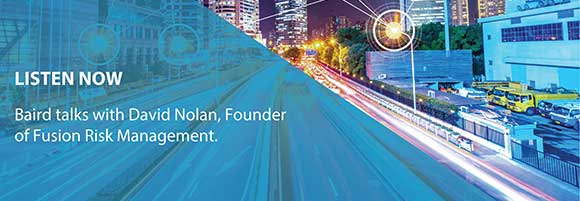PODCAST HIGHLIGHTS: Business Continuity in the Midst of a Pandemic
Investment Banking

Baird’s Podcast Features Fusion Risk Management’s Founder & Strategic Advisor, David Nolan
During these unprecedented and uncertain times, Baird is committed to continuing to share insights from our industry experts, as well as those of our valued partners. Here are highlights from a recent podcast with Kristy Obuchowski Wallen, Director with Baird Global Investment Banking, interviewing David Nolan, the founder of Fusion Risk Management, a leading provider of cloud-based software solutions for business continuity, integrate risk management, IT disaster recovery, and crisis and indicent management.
They discuss what companies are currently doing to ensure continuity and resiliency during the current pandemic – and more importantly, what could prepare companies of all sizes for future challenges and ensure optimal performance in the face of such risk.
Executive Summary
The genesis and current practices of Fusion Risk Management (Fusion).
Fusion is a company that has been focused from the outset really on organizational resilience and more precisely and specifically operational resilience, meaning anything that could impact the ability of an organization to continue to meet its commitments. Fusion’s objective was to help organizations establish and maintain command and control day in and day out, right through a crisis. The company is focused on protecting the covenant of trust and a company's brand.
How has the risk management atmosphere for provider and clients changed since the end of 2019 and what are the challenges going forward?
The challenge will be to see how much of this experience sticks going forward. The focus on agility has made organizations vulnerable and fragile. Whereas risk managers thought about, ‘what risks do I have within my own four walls,’ it's become apparent that risks exist in the supply chain and in public infrastructures. In contrast, operational risk systems – that provide business resiliency – are helping because they put management in command and control.
When we think about business continuity and organizational resilience, oftentimes people think of an active shooter, a terrorist attack or a major storm. Is a pandemic one of the variables that providers are prepared for?
What are the most common requests Fusion is getting from clients in today?
First and foremost, customers are asking Fusion to help them report and visualize data in ways that support the decisions they need to make. On a broader basis, organizations are asking what can they do now. And Fusion’s answer consistent: Focus on your employees, customers, suppliers and community. Also, Fusion helps companies prepare for a “new normal.” Fusion is systems that help them establish that business competency so they're prepared.
Many companies attempt to build plans for either a workforce disruption, a workplace disruption, a supply chain disruption, or a technology disruption. The current scenario has triggered all of these. What should companies be focusing on today?
Again, they should be focused first on the health and welfare of their employees. This includes sanitizing the work environment, equipping people to interact and engage, and supporting their mental health. For the business, communication to all stakeholders is critical, and contemporaneous note-taking is absolutely essential. Ultimately, companies also need a plan to return to a new normal where you're focused on organizational resilience, safety and operational effectiveness.
What are examples of value or return on investment delivered to a client in times like these? And how can companies measure their success with a business resiliency provider versus without?
Generally, there are four ways to think about a return on investment as it relates to operational and organizational resilience.
- Risk-adjusted decision-making – theability to make decisions that identify redundancies and single points of failure; and then eliminate redundancies and eliminate single points of failure.
- Risk-based investments – such as redundant locations or alternate supply chains, which must be balanced against the full spectrum of potential investments.
- Program management effectiveness and efficiency – creating processes where essential underlying data is continually updated.
- Risk mitigation and avoidance – which should be done to support the first three, not just to have “something less bad” happen.
Do Fusion’s continuity plans change based on industry?
The preparation is very similar, but there are nuances of intensity based on industry. The matrix begins with the four potential impacts (workplace, workforce, supply chain, and technology). On the other axis, each client has specific strategies – and they need to be realistically deployable.
For companies who don't have a business resiliency provider today and may be grasping at survival, what can those companies be doing right now?
The obvious financial answer is to preserve cash, and currently prevalent. Beyond that: Take care of your employees, particularly key employees; think as broadly as you can, including how to restart your supply chain; and establish responsibility for taking notes making sure that includes the “why” for almost everything you do.
What behavior changes do you see operators making on a go-forward basis? And how might that impact M&A and private equity investments?
Things will be different, so Fusion is already creating: policies and protocols for conducting web meetings, even for people in the same office; workplace configurations; administering training; professional behaviors, including travel; and how to maintain a safer, cleaner work environment.
Regarding the investor, the due diligence is going to get even more intense and focus more on organizational resiliency, supply chain flexibility and customer diversity.
